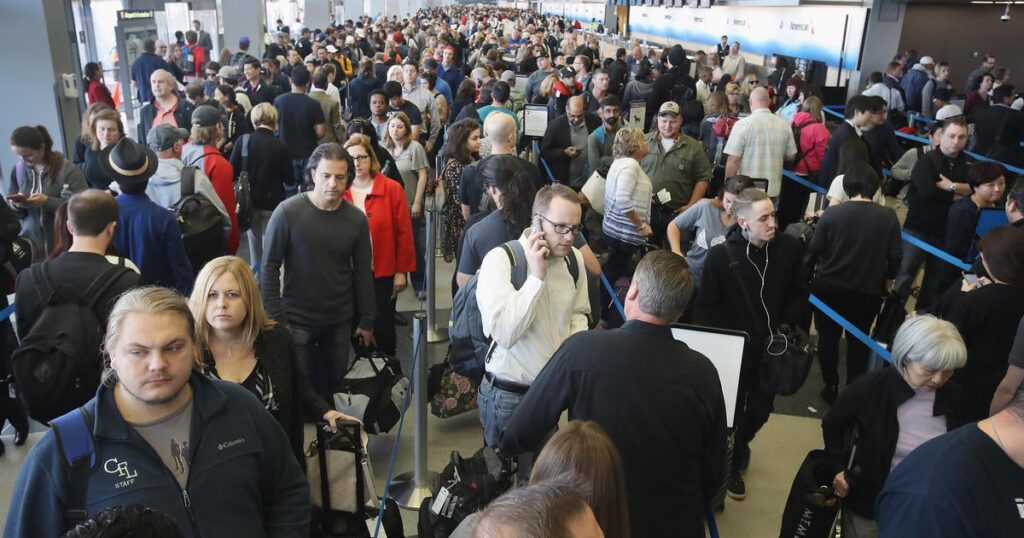[ad_1]
The Transportation Security Administration (TSA) has cautioned that a looming government shutdown could lead to longer wait times for travelers at airport security checkpoints. The warning comes as the TSA announced it is expecting a record 40 million airline passengers to take to the skies over the two-week holiday travel period that began Thursday.
Most TSA workers, about 95%, are considered essential, and would therefore remain on the job in the event of a shutdown — but without pay — TSA administrator David Pekoske said in a post on X.
Air traffic controllers are also deemed essential employees and would be expected to work while foregoing a paycheck. Employees would be paid after a shutdown were to end.
The U.S. Travel Association, a trade group representing the industry, on Friday said a government shutdown could cost the sector $1 billion per week given that disruptions would occur during a peak travel period.
“A prolonged government shutdown threatens holiday travel disruptions that Americans won’t tolerate,” Geoff Freeman, the group’s CEO, said in a statement. “It’s hard to see how anyone in Congress wins if they force TSA workers, air traffic controllers and other essential employees to work without pay during one of the busiest travel periods of the year.”
A survey by the group also found that 60% of Americans said they would consider changing their travel plans if a government shutdown occurs, including canceling flights and trips altogether, resulting in significant economic losses for travel-related businesses.
Here is how a government shutdown will affect air travel for consumers.
Will the government shutdown affect flights?
Not for now. Passengers will still be able to travel on flights they have booked, with operations expected to continue as normal at least in the early days of a shutdown. That’s because TSA agents, air traffic controllers, and other essential airport staff will remain on the job.
Will TSA screening lines be longer?
While passengers are always encouraged to arrive at the airport earlier than usual during peak travel periods, that advice could be even more applicable in the event of a shutdown.
“While our personnel are prepared to handle high volumes of travelers and ensure safe travel, please be aware that an extended shutdown could mean longer wait times at airports,” the TSA’s Pekoske warned.
“My advice? Arrive at your airport early, with plenty of time to park your car, check your bags and make your way through security,” he added.
The last government shutdown, in 2018-2019, lasted 35 days. While TSA officers were also deemed essential then, the number officers who called out sick rose as the shutdown dragged on and financial woes ensued.
“It was after TSA officers started missing paychecks that you saw the sick call numbers increase,” said senior CBS News senior transportation and national correspondent Kris Van Cleave. “There may not be an immediate impact at all airports, particularly if it is a short shutdown. If it drags on, then you have a workforce that is among the lowest-paid government employees,” he said.
If, in the event of a prolonged government shutdown, TSA employees stop showing up to work in significant numbers, wait times at security screening checkpoints would likely increase.
What about air traffic controllers?
The Federal Aviation Administration (FAA) is already grappling with a shortage of air traffic controllers, who are responsible for securing the national airspace by guiding takeoffs and landings and ensuring that aircraft don’t fly too close to one another. About a month into the last shutdown, LaGuardia Airport temporarily delayed flights because of staffing shortages, including among air traffic controllers.
In the event of a shutdown, the more than 14,000 air traffic controllers in the U.S. would be expected to show up to work without pay.
What would a government shutdown mean for passport processing?
According to the State Department’s contingency plan, consular operations will continue as normal “so long as there are sufficient fees to support operation,” given that they are integral to national security. That includes passport and visa services.
Still, some passport services could be limited, if they are located in buildings run by another agency that is inoperational.
[ad_2]
Source link

